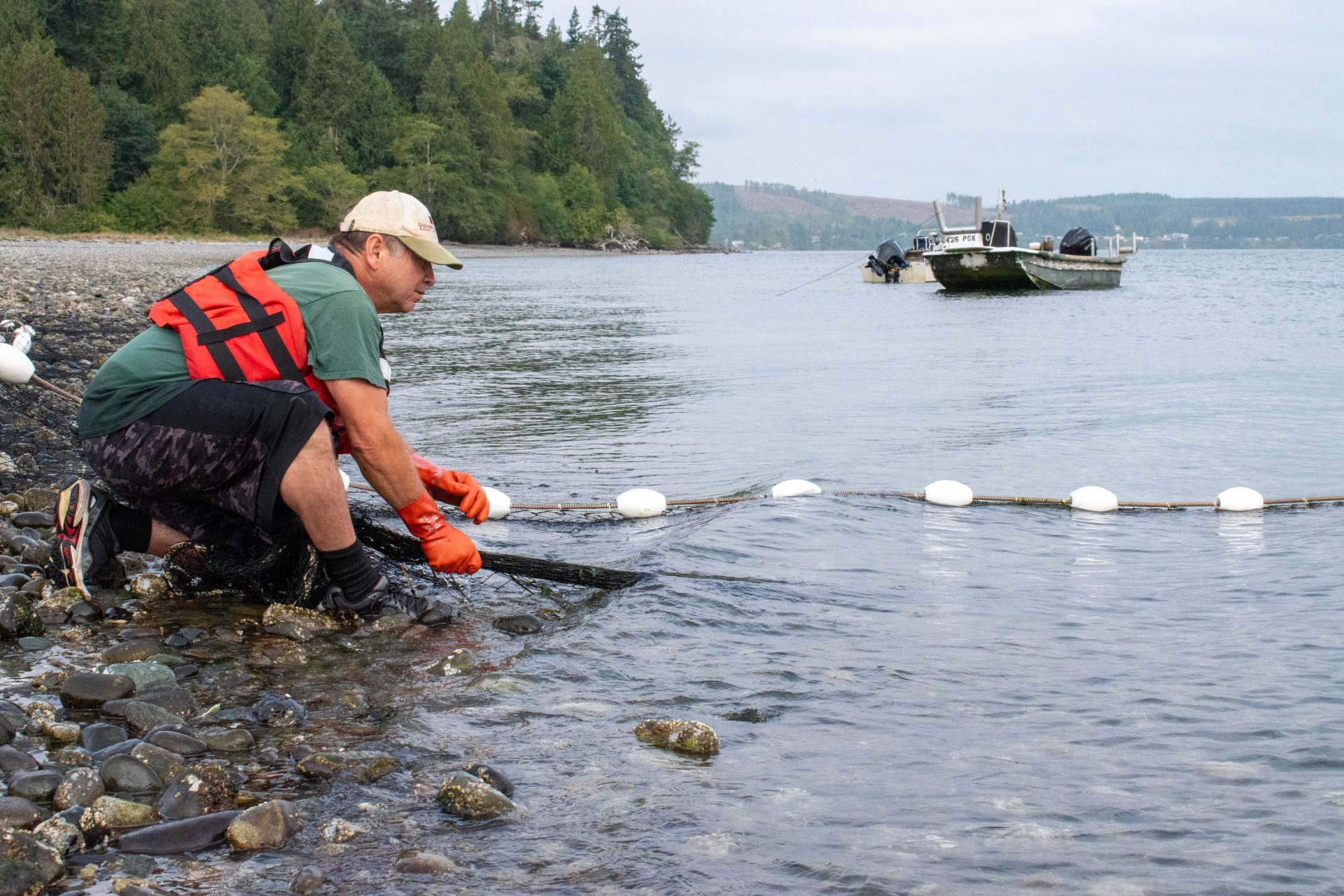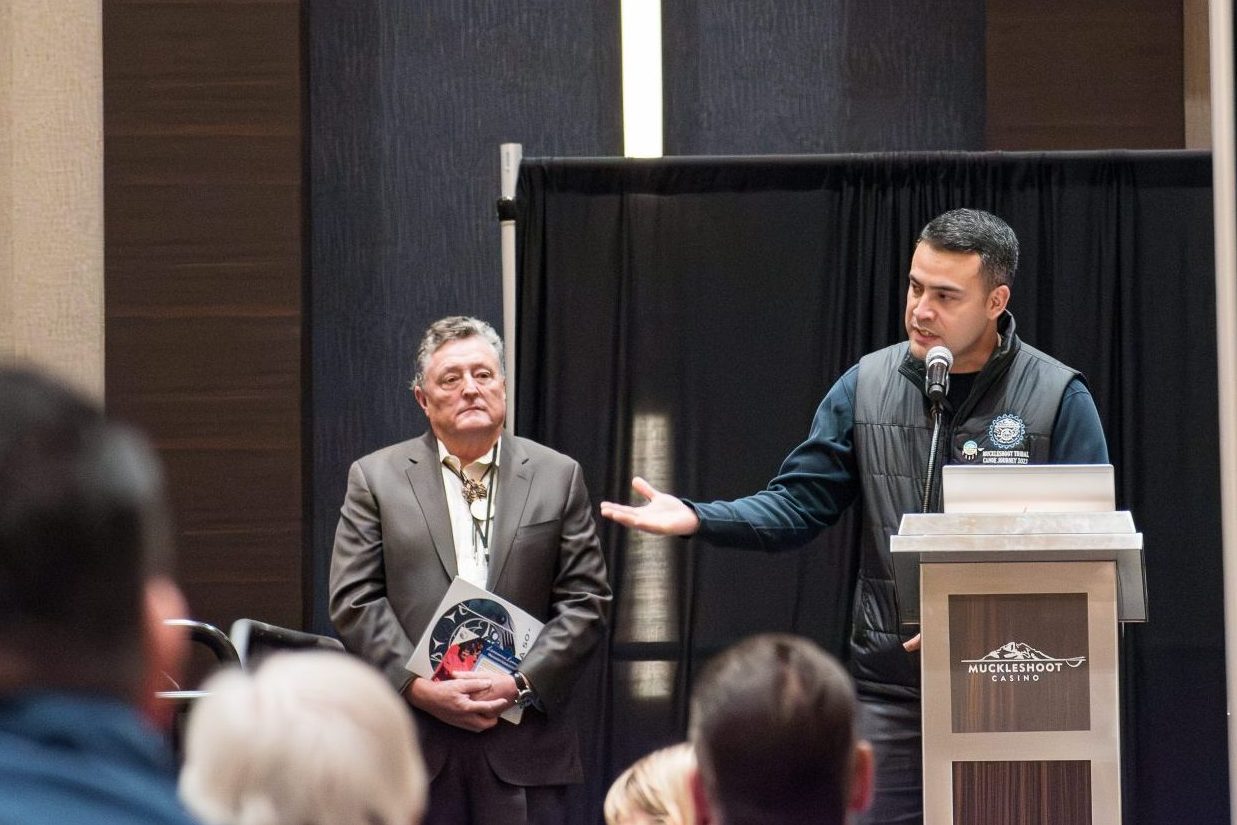BRIEF UPDATE ON THE BUDGET
There has been substantial effort by tribes and the Northwest Indian Fisheries Commission to brief key members of Congress and their staffs on the ongoing appropriations needs for natural resource management in the U.S. v. Washington Case Area. (Current budget expenditures are on track, e.g., NWIFC has expended 42% of its budget since the start of FY 2004). Northwest delegations have traveled to DC several times over the past few months to convey ongoing priority needs, ranging from shellfish program support to hatchery rehabilitation, and the fact that tribes are under-funded for the work that needs to be done in salmon recovery, etc. Briefly, progress has been slow on Unresolved Hunting and Fishing, there have been assurances that FY-2005 Coastal Salmon Restoration Funding will go back to the FY ’03 level of $9 million for Pacific coastal tribes, objections were issued regarding delays in the Chinook Harvest Plan and resulting impacts on the Pacific Salmon Treaty, and backgrounders have been provided on various needs ranging from ESA implementation to mass marking-related costs. It currently appears that funding will be reduced for non-Indian TFW Forest and Fish implementation with a two-year transition strategy. Tribal TFW/FF funding appears secure for now. For more details, please contact NWIFC.
Note: Much has been said about the current lack luster performance of the Senate in this short-session, election year. Some members have even indicated it may be time to give up efforts to get much done, given the polarization that exists. Although interest in passing budgets continues, it is possible for the same scenario as last year to unfold, i.e., passage of continuing resolutions to keep government “in business” followed by a late omnibus bill. Only time will tell. Meanwhile, NWIFC efforts continue to get Congress to live up to its funding responsibilities to the tribes.
SHELLFISH AGREEMENT: TRIBAL RESOLUTIONS NEEDED
The shellfish agreement between growers and tribes (regarding tribal rights to naturally-occurring shellfish on commercial tidelands) has been circulated to tribes and approval, by tribal council resolution, is needed by the end of the month. This is essential to ensure the State OFM and federal BIA include the monies in their budget requests. The agreement calls for a one-time settlement of $11 million from the state and $22 million from the federal government. NWIFC is working with the State OFM and legislature and the federal OMB and congressional delegation (to get the funding through the Department of Interior). The agreement is based on the funding being committed by November, 2005.
TRIBES/BIA MEET ON BUDGET ALLOCATIONS
Tribal officials from across the country recently met with BIA leaders to develop a proposed $2.25 billion budget for FY ‘06—a 7 percent increase over FY ’06. The proposal counters 2.4 percent budget reductions Bush officials have projected for tribal programs. Among other Bureau officials at the meeting was Assistant Secretary David Anderson. The two-day meeting was spearheaded by the four-year-old Tribal Budget Advisory Council (TBAC), which was created to provide a forum for tribal representatives to meet with BIA officials to assess budget needs and to recommend strategies to improve budgetary responses to unmet needs.
TBAC recommended an increase to Tribal Priority Allocations (TPA) of 7%, an estimated $54 million, to address inflation and recent shortfalls. TPA is the primary funding source for most tribes in the provision of governmental services at the local level, and tribal leaders identify the persistent shortfall in TPA over the past decade as a severe impediment to tribes’ ability to fulfill the goals of self-determination and self-governance. Other priorities set by the Advisory Council for requested 7% increases include Law Enforcement and Detention Centers, Contract Support Costs, Scholarships, funding for United Tribes Technical College/ Crownpoint Institute of Technology, Tribal Courts, Social Services, ICWA, HIP, Economic Development, and Natural Resources. Anderson had announced in March that BIA programs would see a 2.4% cut in FY06, equivalent to a 3.6% cut and $78 million when accounting for inflationary costs. The proposed FY06 reduction would represent the second major reduction to the BIA budget in Bush’s requests, as the request included $52 million less for the Bureau in FY05. He told the gathered leaders from the 12 BIA regions he would strive to work with tribes on reaching a budget agreeable to all parties. He stressed the need for tribes to see themselves not as victims, but as ""architects of our own destiny."" He said a positive attitude is needed to replace the destructive forces facing Native American youth, plagued with high rates of alcoholism, suicide, and school dropout.
The TBAC gathering also passed a resolution recommending an Executive Order requiring the OMB to annually consult with tribes, prior to submission of the budget, to assure compliance with the federal trust responsibilities to the tribes. Also, a committee for managing data/reporting was established to help reflect the degree to which federal dollars for tribal programs are efficiently used. The BIA planned to turn in its proposed budget to the Office of Management and Budget on May 14.
SEN. DASCHLE CALLS FOR AN END TO BIA BUDGET CUTS
Senator Tom Daschle (D-SD) has called on the Bush administration to abandon plans to cut funding for the BIA by nearly $80 million in Fiscal Year 2006 and urged consideration of the alternative budget drafted by TBAC, saying the proposed cuts would have a devastating impact on the already underfunded agency.
“These proposed cuts would do significant harm to people and communities that have already suffered greatly because of the policies and neglect of the federal government,” said Senator Daschle. “Our government must not continue to deny Native Americans the benefits and services they have been promised. Assistant Secretary Anderson and White House officials recently visited reservations in South Dakota, so I know they are familiar with the staggering unmet needs of Indian Country. I sincerely hope Mr. Anderson will consider carefully the recommendations of the Tribal Budget Advisory Council and provide the BIA the funding it needs to meet our government’s trust and treaty obligations.”
ESA UNDER ATTACK AGAIN
Rep. Richard Pombo (R-CA) is again on the attack against the Endangered Species Act. Nearly a decade ago, during the ""Gingrich Revolution,"" Pombo was one of two representatives chosen by the GOP leadership to assault the law, but the ""reforms"" he proposed then were so radical they never came close to passing. Now Pombo, chair of the House Resources Committee which oversees ESA, is changing his tactics, taking a piecemeal approach. His committee recently heard a bill sponsored by ally Dennis Cardoza (D-CA), which would forbid the Interior Department from protecting the habitat of an endangered species until a ""practicable, economically feasible, and determinable"" species-recovery plan was developed, a provision environmentalits say would delay any designation of critical habitat indefinitely. In advance of the hearing, Pombo issued a seven-page position paper bashing the ESA, citing cases of ""failure"" that are disputed by virtually everyone but Pombo’s cohorts.
CRITICAL HABITAT REFORM ACT HEARD
After the House Committee on Resources heard H.R. 2933 (the Critical Habitat Reform Act, which merges the critical habitat component of ESA with the larger effort of recovery planning) recently, Pombo said, ""There appears to be a growing, bi-partisan consensus that the critical habitat component of the Endangered Species Act must be improved to embrace the goal of species recovery. I believe this bill will do just that."" Additional comments made it clear that the purpose of the bill is to provide relief from the economic impacts of fish and wildlife management decisions on landowners, local governments and the economy. Testimony from the U.S. Fish and Wildlife Service included an announcement of revised agency regulations for endangered species conservation agreements on private lands, providing clearer definitions and more certainty for property owners to “incentivize” private conservation. ""Issuing these revised regulations will encourage the people who matter most – America’s ranchers, farmers, and private land owners – to engage in voluntary measures to conserve species on their lands,"" said Chairman Pombo. ""This spirit of cooperation is essential to recovering endangered species across the country, as more than ninety percent of our species live on private lands.""
For more information, read the report The ESA at 30: A Mandate for Modernization
WILD SALMON = HATCHERY FISH?
Bush’s new policy toward the role of hatchery-bred salmon in the restoration of wild salmon stocks could count hundreds of millions of hatchery-bred salmon when assessing the overall health of wild salmon. It follows they’ll also be counted when making the decision about whether several salmon species will continue to receive protection. Until now, the health of wild salmon stocks has been the gauge of whether or not a salmon species receives protection under ESA.
The Bush plan drew opposition from Senators Murray and Cantwell, as well as environmental and fishing advocates, but predictable praise from farmers and industry groups.
Much tribal concern is centered on the policy’s reported definition of an Ecological Significant Unit (ESU). The policy broadly includes both hatchery and wild salmon in defining an ESU. Yet in conducting status determinations of ESU’s to ascertain whether protection under ESA is warranted, the policy excludes those same hatchery fish and focuses solely on providing protection to naturally spawning salmon populations and their ecosystems. This is the same approach that led NOAA Fisheries to the legal dilemma it now faces in light of the Hogan ruling. Tribes have said they agree that naturally spawning populations and their ecosystems should be the focus of ESA. However, the policy incorrectly expands the definition of an ESU to include hatchery salmon, even though viable naturally spawning salmon are not dependent on hatcheries. “The status of an ESU must be based solely on the health of naturally spawning salmon,” NWIFC Chair said. “Including hatchery fish artificially inflates the size of an ESU, masking its overall health and weakening support for wild salmon recovery efforts.”
A letter stating these and other concerns has been sent by NWIFC to Senators Ben Nighthorse Campbell (R-CO) and Senator Daniel K. Inouye (D-HA) in a request for input on the issue during the recent hearing by the Senate Committee on Indian Affairs on the Native American Fish and Wildlife Management Act. Copies of the letter are available on request.
NAFWMA HEARD
S 2301, the Native American Fish and Wildlife Management Act, was heard by the Senate Committee on Indian Affairs on April 29, and two extensive work sessions were conducted by the committee during the same week in an effort to fine tune the bill. The bill, sponsored by Sen. Daniel Inouye (D-HA), would provide support to tribes in natural resource management, require federal land managers to enter into agreements with tribes to co-manage fish and wildlife, and provide federal support for natural resource planning, tribal education, public education about tribes, and marketing of tribal fish and products. It also has sections to support buffalo tribes and Alaskan Natives. National environmental groups might have some concerns with the draft legislation as it might appear that federal agencies would defer to tribal rights and programs with management of federal lands off-reservation. This was not the intent of the bill, and the SCIA staff is working to find amicable solutions that will enable the bill to serve the tribes well, and have a chance of passage. The written record on the bill is open for 30 days past the 4/29 hearing. Copies of NWIFC testimony have been distributed to all tribes.
APOLOGY TO THE TRIBES
A Senate Joint Resolution proposed by Senators Sam Brownback (R-KS), Ben Nighthorse Campbell (R-CO) and Daniel Inouye (D-HA) would apologize to the tribes for the long history of official depredations and ill-conceived U.S. policies suffered by Native Americans. The resolution, a legislative tool to express the opinion of both the Senate and House. They do not normally have the force of public law, but can be signed by the President as an official enactment. Sen. Brownback held a press conference on May 6 to announce the resolution. NWIFC sent a letter supporting the resolution. The letter asked that it strengthen the acknowledgment that repression of tribes continues today through, among other things, the continued assault on fish and wildlife habitat, under-funding of various tribal programs and lack of public understanding about tribes and treaties. It was also advised that the resolution include a reaffirmation of HCR 331, passed in 1988, which acknowledged the contribution of the tribes to American democracy, reaffirmed government-to-government relations, reaffirmed the trust responsibility of the U.S. to the tribes and acknowledged the need to exercise good faith in upholding treaties with the tribes. Copies of the resolution and the NWIFC letter have been distributed to all tribes.
BIA HEAD CRITICIZED
David Anderson (Chippewa/Choctow), head of the BIA and widely known as “Famous Dave” for a restaurant chain he owns, has been criticized for recusing himself from tribal recognition, casino gambling and related land disputes, just four months after being confirmed by the Senate, saying he did not want past business deals to ""cloud the issue."" Interior Secretary Gale A. Norton signed his request to delegate his authority to Aurene Martin, a deputy, over the high profile issues. Anderson, a barbecue restaurant magnate and co-founder of Grand Casinos Inc., was nominated by President Bush and confirmed by the Senate in December. His recusal was criticized during a House committee hearing and by Indian representatives. Connecticut Attorney General Richard Blumenthal told members of the House Committee on Government Reform he was deeply troubled that the recusal applies across the board rather than in individual cases. Blumenthal is disputing requests by groups seeking legal recognition as Indian tribes, which would allow them to build and operate casinos in Connecticut. ""A recusal of this kind goes to core responsibilities of his office and is very problematic legally and ethically. This bypasses congressional oversight and scrutiny. . . . Aurene Martin isn’t confirmed by anybody. She’s not accountable in the same way,"" he said. Vernon Bellecourt of AIM said, ""He’s gone too far in shirking his responsibilities to tribes who are either trying to regain federal recognition as a tribe or to develop resort casino complexes. Most Indian people endorsed him because he is a tribal member. He should not shirk that responsibility.""
TRIBES PREPARED TO SUE OVER SPILLS
The Bonneville Power Administration wants to generate more electricity this summer by limiting water spills for fish. But tribes and other fish advocates have vowed to file a lawsuit to block the effort to change the policy of opening spillways through August while fish are migrating. Rick George of the Umatilla tribes said water spilled over the tops of the dams provides essentially a water slide for the juvenile fish to pass the dam safely. It attempts to mimic, in a scientific way, the way the river used to operate. Today it’s dammed up into eight federal pools and spill allows it to behave a little bit more like a river instead of just a hydro system. But spills reduce power generation at the dams because the spilled water bypasses turbines. BPA is proposing to diminish spills in July and August, saying it would save the company $77 million.
TRIBAL FOREST BILL UNANIMOUSLY PASSES HOUSE RESOURCES SUBCOMMITTEE
The House Resources Subcommittee on Forests and Forest Health has unanimously passed H.R.3846, the Tribal Forest Protection Act of 2004, a bill introduced by Committee Chair Richard Pombo (R-CA). The bill has strong bipartisan support and four democratic cosponsors. Following approval, the bill will now move to the House floor. It follows in the footsteps of the Healthy Forests Restoration Act, and establishes a process for tribes to work with federal agencies to perform hazardous fuel reduction and forest health projects on adjacent lands to prevent catastrophic wildfire. In the summer of 2003, nearly 20 Indian reservations were devastated by wildfire that came from adjacent federal lands. Over half occurred in Southern California where more than 30,000 acres were burned and 130 homes consumed, killing 10 people. Two of the reservations were burned entirely to the ground.
TRANSPORTATION BILL PASSES HOUSE, CONFERENCE AHEAD
The House of Representatives passed the reauthorization of TEA-21 last month by a vote of 357-65. The measure will now be conferenced with the Senate’s version. The bills are significantly different—the House bill contains $275 billion in funding, while the Senate version has $318 billion-so the conference promises to be challenging.




